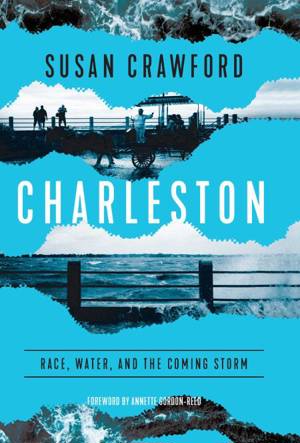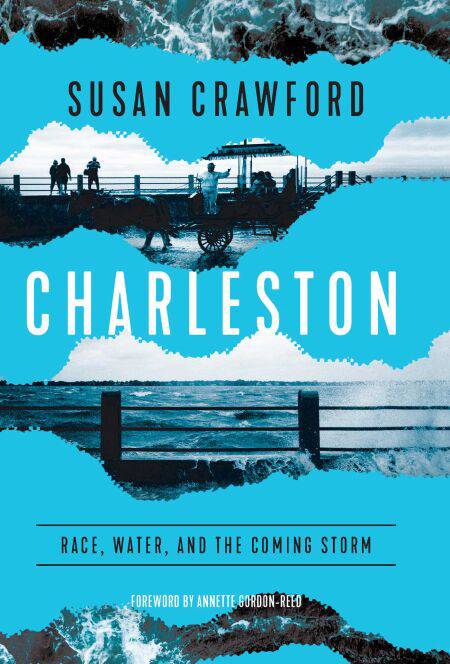
- Retrait gratuit dans votre magasin Club
- 7.000.000 titres dans notre catalogue
- Payer en toute sécurité
- Toujours un magasin près de chez vous
- Retrait gratuit dans votre magasin Club
- 7.000.0000 titres dans notre catalogue
- Payer en toute sécurité
- Toujours un magasin près de chez vous
16,76 €
+ 16 points
Format
Description
An unflinching look at a beautiful, endangered, tourist-pummeled, and history-filled American city.
At least thirteen million Americans will have to move away from American coasts in the coming decades, as rising sea levels and increasingly severe storms put lives at risk and cause billions of dollars in damages. In Charleston, South Carolina, denial, boosterism, widespread development, and public complacency about racial issues compound; the city, like our country, has no plan to protect its most vulnerable. In these pages, Susan Crawford tells the story of a city that has played a central role in America's painful racial history for centuries and now, as the waters rise, stands at the intersection of climate and race.
Unbeknownst to the seven million mostly white tourists who visit the charming streets of the lower peninsula each year, the Holy City is in a deeply precarious position. Weaving science, narrative history, and the family stories of Black Charlestonians, Charleston chronicles the tumultuous recent past in the life of the city—from protests to hurricanes—while revealing the escalating risk in its future. A bellwether for other towns and cities, Charleston is emblematic of vast portions of the American coast, with a future of inundation juxtaposed against little planning to ensure a thriving future for all residents.
In Charleston, we meet Rev. Joseph Darby, a well-regarded Black minister with a powerful voice across the city and region who has an acute sense of the city's shortcomings when it comes to matters of race and water. We also hear from Michelle Mapp, one of the city's most promising Black leaders, and Quinetha Frasier, a charismatic young Black entrepreneur with Gullah-Geechee roots who fears her people’s displacement. And there is Jacob Lindsey, a young white city planner charged with running the city’s ten-year “comprehensive plan” efforts who ends up working for a private developer. These and others give voice to the extraordinary risks the city is facing.
The city of Charleston, with its explosive gentrification over the last thirty years, crystallizes a human tendency to value development above all else. At the same time, Charleston stands for our need to change our ways—and the need to build higher, drier, more densely-connected places where all citizens can live safely.
Illuminating and vividly rendered, Charleston is a clarion call and filled with characters who will stay in the reader’s mind long after the final page.
At least thirteen million Americans will have to move away from American coasts in the coming decades, as rising sea levels and increasingly severe storms put lives at risk and cause billions of dollars in damages. In Charleston, South Carolina, denial, boosterism, widespread development, and public complacency about racial issues compound; the city, like our country, has no plan to protect its most vulnerable. In these pages, Susan Crawford tells the story of a city that has played a central role in America's painful racial history for centuries and now, as the waters rise, stands at the intersection of climate and race.
Unbeknownst to the seven million mostly white tourists who visit the charming streets of the lower peninsula each year, the Holy City is in a deeply precarious position. Weaving science, narrative history, and the family stories of Black Charlestonians, Charleston chronicles the tumultuous recent past in the life of the city—from protests to hurricanes—while revealing the escalating risk in its future. A bellwether for other towns and cities, Charleston is emblematic of vast portions of the American coast, with a future of inundation juxtaposed against little planning to ensure a thriving future for all residents.
In Charleston, we meet Rev. Joseph Darby, a well-regarded Black minister with a powerful voice across the city and region who has an acute sense of the city's shortcomings when it comes to matters of race and water. We also hear from Michelle Mapp, one of the city's most promising Black leaders, and Quinetha Frasier, a charismatic young Black entrepreneur with Gullah-Geechee roots who fears her people’s displacement. And there is Jacob Lindsey, a young white city planner charged with running the city’s ten-year “comprehensive plan” efforts who ends up working for a private developer. These and others give voice to the extraordinary risks the city is facing.
The city of Charleston, with its explosive gentrification over the last thirty years, crystallizes a human tendency to value development above all else. At the same time, Charleston stands for our need to change our ways—and the need to build higher, drier, more densely-connected places where all citizens can live safely.
Illuminating and vividly rendered, Charleston is a clarion call and filled with characters who will stay in the reader’s mind long after the final page.
Spécifications
Parties prenantes
- Auteur(s) :
- Editeur:
Contenu
- Nombre de pages :
- 336
- Langue:
- Anglais
Caractéristiques
- EAN:
- 9781639363582
- Date de parution :
- 03-04-23
- Format:
- Ebook
- Protection digitale:
- Adobe DRM
- Format numérique:
- ePub

Les avis
Nous publions uniquement les avis qui respectent les conditions requises. Consultez nos conditions pour les avis.






